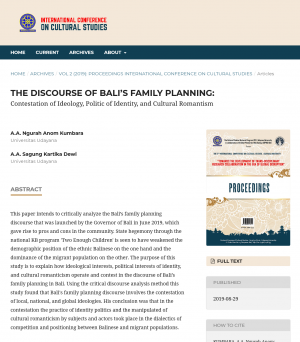Born in Klungkung 14 February 1957, he completed his Bachelor of Anthropology in 1982 at Udayana University, completed his Masters degree at Indonesia University in 1990, and doctoral degree at Gadjah Mada University in 2008. Becoming a lecturer at Faculty of Cultural Knowledge Udayana University since 1983 until now. He was on charge as the head of the anthropology department in 1997-2000, as the head of Hindu Indonesia University's S3 program of Religion and Culture in 2008-2011, as a secretary of the field of service in Institute for Research and Community Service Udayana University in 2011-2015, as the head of doctoral program (S3) Cultural Studies, Faculty of Cultural Knowledge, Udayana University from 2018 until 2022. He actively participates in seminars and writes accredited national and international journals, and has written several books.
Nothing was added yet.



Enable comment auto-refresher